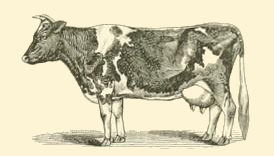How William the Conqueror Saved the Modern Meat Industry

The European Middle Ages was a boring time for Europe—lots of plagues and kings and Crusades, but nothing much of enduring value getting produced. The main accomplishments in science, culture, and government were happening in the Muslim world and, with the exception of building cathedrals, no one in Europe seems to have done anything all that interesting.
But one interesting thing that did happen in the Middle Ages was the Norman Conquest of the Anglo-Saxons. In 1066, William the Conqueror crossed the English Channel from France, won the Battle of Hastings and became king of England. That’s important for people who speak the English language, because over the next couple of centuries, English people started using lots of words borrowed from their French overlords.
One of the strange ways the English absorbed the vocabulary of their new masters was to take the French words for various kinds of livestock and apply them to the food versions of those animals. (I actually learned this from the History episode of the BBC quiz show QI—see the 20:00 mark for a discussion of meat words.) So the French word for cow—boeuf—became our word for dead-cow-that-you-eat: beef. Their word for sheep—mouton—became our word for edible sheep: mutton. (It’s weird, incidentally, that no one eats sheep anymore—just lamb.) Likewise, we don’t call baby cow meat “calf,” we call it “veal,” because the French word for baby cow is veau. And we eat pork instead of “pig”—how gross would that be—because the French way of saying “pig” is porc.
The whole process was a huge marketing coup for anglophone farmers everywhere: the Frenchified meat titles provide a nice amount of distance between the braised, aromatic flank of whatever it is on your plate, and the oinking, bah-ing, mooing creatures frolicking away at pasture, which many people find quite cute.





